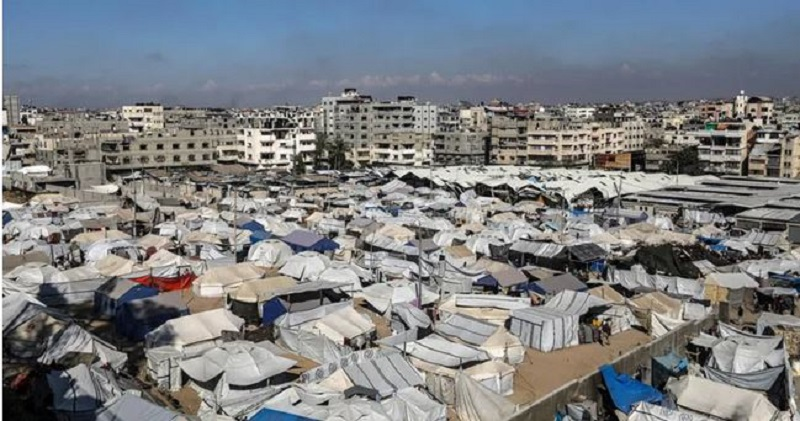- UNRWA Situation Report on Crisis in Gaza & Occupied West Bank |
- Intimidation or bloodshed cannot halt Bangladesh’s march to democracy |
- Khaleda Zia integral to an important chapter in BD history: Yunus |
- Enthusiasm marks Victory Day celebrations across Bangladesh |
- Dhaka-Delhi ties deep; to be shaped by trust, dignity, mutual respect |
US backs private aid plan for Gaza despite UN opposition

The United States has confirmed the development of a new system to deliver humanitarian aid to Gaza through private companies, as Israel’s blockade on the enclave continues for a third consecutive month.
According to the US ambassador to Israel, the plan involves the creation of distribution centres secured by private contractors, aimed at providing food and essential supplies to more than a million Palestinians. The ambassador stated that Israeli forces would not be involved in the distribution itself but would be responsible for securing the perimeters of the aid hubs to prevent interference from Hamas.
This initiative comes despite strong objections from United Nations humanitarian agencies, which have reiterated their refusal to participate, warning that the plan risks turning aid into a political tool. A spokesperson from the UN’s humanitarian office said the system contradicts core humanitarian principles, stressing that “there is no reason to implement a system that fundamentally opposes the DNA of principled humanitarian action.”
Since early March, all aid supplies—including food, medicine, and fuel—have been barred from entering Gaza, worsening an already dire humanitarian crisis for its 2.1 million residents. A third of Gaza’s community kitchens have shut down in the past fortnight due to severe shortages, including the last field kitchens run by a major US-based food charity, which had previously provided over 130,000 meals daily.
The cost of basic food items has skyrocketed, with the price of a 25kg bag of flour now reaching $415—around thirty times higher than in February.
The US administration is pushing this plan forward ahead of an upcoming visit to several Gulf countries that may be asked to help fund the operation. A newly registered entity, the Gaza Humanitarian Foundation (GHF), is reported to be behind the project. A document outlining its proposal details plans for four distribution sites aimed at initially serving 1.2 million people, with the goal of eventually reaching the entire population. It claims to follow humanitarian principles such as neutrality, independence, and impartiality.
Former senior humanitarian officials, including a past head of the UN’s food programme and a former executive of a leading food charity, are reportedly linked to GHF’s advisory board, although confirmation of their involvement is pending.
However, the plan has sparked widespread criticism over its feasibility and ethical implications. Aid officials have warned that directing civilians to militarised zones to receive assistance could increase suffering, especially for vulnerable groups like children and the elderly. Concerns have also been raised that the plan may be used to pressure displaced Palestinians into relocating further south, with all proposed distribution sites located in southern Gaza.
Recent assessments suggest that just 60 aid trucks would enter Gaza under the plan—far fewer than the daily average during previous ceasefires and insufficient to meet escalating needs. Humanitarian agencies maintain they already have large amounts of aid ready at Gaza’s border crossings, awaiting permission to enter.
Critics argue that this private-sector initiative fails to meet the minimum standards for humanitarian aid delivery. They caution that if such a model were accepted, it could damage the perceived neutrality of aid organisations and set a troubling precedent for future conflicts.
Meanwhile, in northern Gaza, Palestinians continue to endure extreme deprivation. At one community kitchen in Jabalia, hundreds waited for hours in the hope of receiving food. One woman, waiting with her cooking pot, said: “Every day I come here, but the food is never enough. We’ve had nothing for two months—no flour, nothing. Open the borders so we can eat.”
Another man, whose pregnant wife is sick, added: “We can’t even get to the hospital, let alone to Rafah. How are we supposed to travel to get aid?”
Israel’s ongoing military operations in Gaza, launched in response to attacks on 7 October 2023, have so far killed over 52,700 people, mostly women, children, and the elderly, according to health officials in Gaza. Israel says its campaign aims to dismantle Hamas and prevent further attacks.
International condemnation has followed Israel’s announcement of a potential expansion of military operations and control over Gaza, with growing calls for unrestricted humanitarian access to prevent mass starvation and further displacement.

